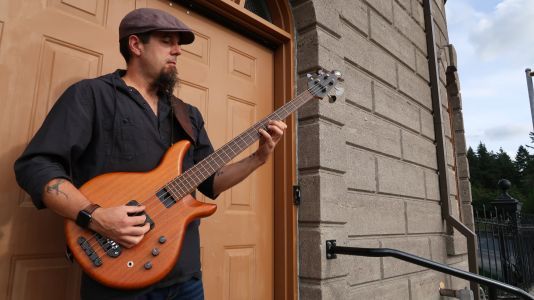Q: Hi Damian, nice to have you here. We’ll get right to it. You’ve been playing bass for some time at this point. Where do you feel you are at in your musical journey?
A: Wow. I could likely write another book with an honest answer to that question! In some ways, I feel like I’ve come quite far but, in most respects, I feel like I’m just now beginning to understand what my role in music is. Knowing my personality, I’ll likely always feel like I’m just now finally getting somewhere on the instrument and within music. I do know what I want to sound like, which is key, and I’ve also come to understand my voice on the instrument. In the bigger picture, I just look forward to seeing how far I can go before time runs out, and where it leads me.
Q: That’s an interesting take, the idea that you’ll always be circling around to thinking you’re just now getting to where you might be figuring things out. A lot of guys who don’t necessarily play professionally might hope to feel that way someday. Any advice to the weekend warriors or the guys who might not have the same amount of chops but want to still feel, at least partially, musically satisfied?
A: My advice to most everybody is the same. Put the music first and the rest takes care of itself. It doesn’t have to be fast, use a bunch of fancy chord scales or be in 13/8 to be impressive. All music requires us to do is listen and react as honestly as we can. Focus on feel and tone and simply try to make music feel good.
The chops come with hours spent on the instrument via muscle memory, especially if you are focusing on challenging music and rhythms, like I did. I tell most of my students to never play anything faster than they can play cleanly. When practicing, focusing on playing things cleanly, articulately, slowly and controlled builds proper muscle memory. Long story, short? Focus on tone and feel. Be a great bass player before you worry about being anything else on the instrument.
Q: You have a pretty long history with several of the most highly regarded luthiers in the world. How did you find Pete and what was different about working with him?
A: Pete and I met while he was still living in Dallas. I was passing through on a tour with Tony Furtado and was lucky enough to meet Pete and I got to try a few of his basses. The most interesting part of that story is that Pete asked to play the bass I was playing at the time, which was a Zon 4 or 6 string. I can’t remember which bass I had on that tour. While Pete and I kept in touch, we didn’t talk too much about a build until a few years later when I realized that I really wanted to go back to wooden necks for my 6 string bass. I never liked the C string on a graphite neck. It was just a little too brittle for my ears. Pete actually remembered an incredible amount about how I had my bass set up and totally understood what I was talking about when we spoke of what I was, and wasn’t, getting out of the bass. He then sent me one extra bass he had laying around just to get my input on what I would change, which I thought was pretty amazing in its own right! The best part was when I told him what I liked and what wasn’t quite right for me, he married that with what he knew of my other basses and got to work on my first custom built Skjold. He absolutely knocked it out of the park.
The thing that I find unique about Pete is his ability to really hone in on exactly what a player wants. Not only that, he understands my very-NON-technical descriptions of what sound I want, how I want it to feel and, because he is a player himself, is able to translate that into a tactile and aural representation of what it is I meant in his instruments. He can turn my, “I want it to sound like chocolate, but defined, not brittle… but defined, punchy, but not to much burp” type descriptions and absolutely nail the sound. Combining that with the fact that he remembered how I like my bass to feel and was so willing to work with me on some things that I had on my wishlist for the body and just nailed it on the first try. I was sold. Every instrument since has been the perfect manifestation of what we set out to do with it. He’s pretty spectacular and very attentive to the needs of the player. He’s not just trying to make basses and move product. He’s trying to make your dream bass and he’s very, very good at what he does.
Q: It seems like after finding Skjold you have stuck with them. What are the standout features of your Skjold basses that have kept you coming back for more?
A: I may have answered much of this already but it’s his attention to detail and the function of the instrument as it relates to the players needs. Every Skjold bass I own feels like the best bass of its kind that I’ve tried, the best 4 string, the best 6 string, and so on. He’s given me everything I wanted in the function of the body, such as easy access to the upper register of the fretboard, a lower bout that sits the bass well and in a good position on my leg while also balancing perfectly, and a slim neck that is also stable. He’s also given me everything I wanted sonically, a 6 string that sounds even from top to bottom, and a four string that growls and articulates just so. He just builds me what I want and what I need. Every time, and without fail.
Q: Getting instruments that do what you actually want is a pretty big deal. I’m sure most of us have had the experience of ordering a bass with a certain goal in mind and it comes out nothing like what we expected, or even asked for. Just to go back to some of your work, you recently mentioned you have a new project in development. Any new directions you might be going in musically?
A: I just began the mixing process for my next album. My goal wasn’t so much a new direction but more of an evolution of my last studio album, “So To Speak”. I wanted to reflect where I am today as a player and hopefully hint at where I’m heading. I’m a rhythm junkie and I love a big fat groove. I never want my albums to sound like a bass record but rather a complete musical statement in a group setting. I like the fact that my album could’ve just as easily been released under anyone’s name in the group and it would’ve been equally as accurate a representation. I have a phenomenal band on this one featuring George Colligan on piano, Tom Guarna on guitar and Reinhardt Melz on drums.
Q: I really like the idea of an album being able to be labeled as belonging to any of the featured players and it would still make sense. Great concept. As a final note, we know the catacomb option largely exists because of the close collaboration between you and Pete. Is there a possibility of any future innovations between you two in store for the future?
A: Pete and I are always tossing around ideas that run through our heads. 9 times out of 10, when I call or email with a brainstorm, he’s already foreseen my need for that and has thought about it already. Suffice to say that we have a few things in mind. Nothing completely mind-blowing or out of left field, I don’t think. I’m very practical when it comes to my instruments. I don’t need another bass for it’s own sake. Whenever I have an idea for something it’s because I see a need somewhere. It’s usually something as simple as a specific sound or, occasionally, a body mod to suit a need. Right now, we’ve been speaking a lot about a few different basses. The two I’m most excited about are his newer catacomb design and a more compact model for all of the traveling I do.
The Catacomb, I’m excited about because I’m already floored by my Catacomb 6 string, which was Pete’s first attempt at such an instrument. It blows me away, so when he tells me that he’s improved upon it greatly, I can’t even imagine it. I’ll just have to wait and hear for myself!
The compact model is purely about function. I fly quite a bit and always like to bring my bass on board. It’s usually cool but, especially overseas, I do have to gate-check my gig bag occasionally and I would love to have something compact enough not to raise the eyebrows of gate agents when trying to board. This will be a headless model with a very small body and a shorter scale length. I’m really looking forward to having a dedicated flying bass so I can travel without anxiety about the safety of my instrument.
Q: All of it sounds great. Thanks for your time Damian!
A: Thanks for having me!



